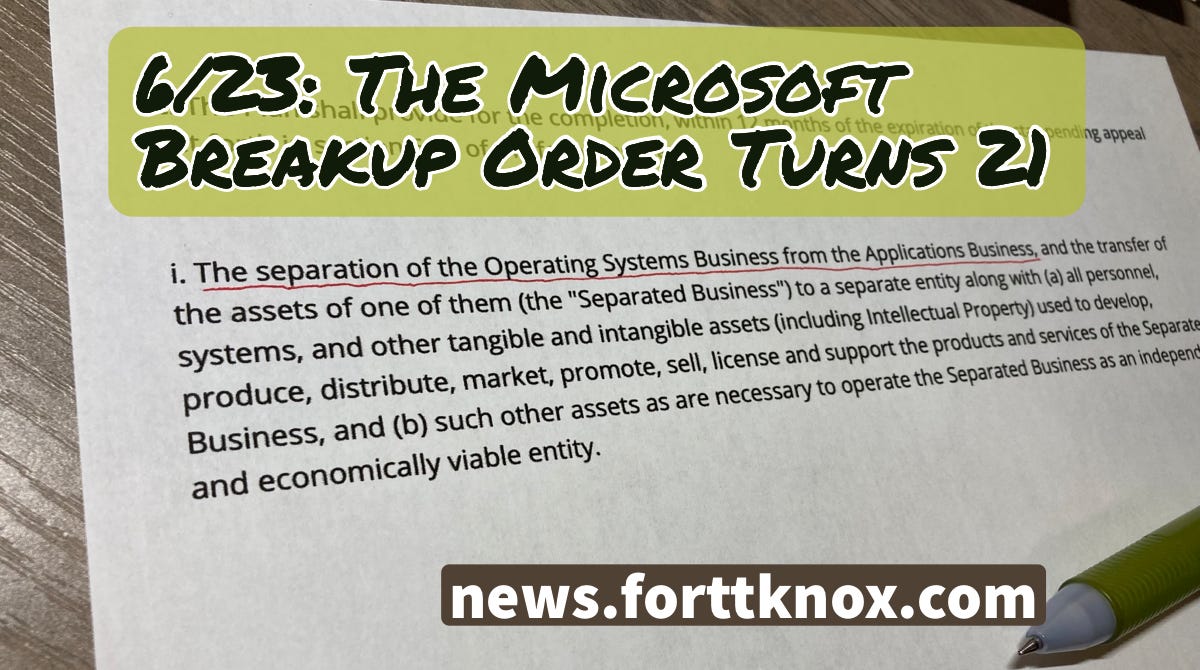What If Microsoft Had Broken Up?
Your daily head start in the business of tech + filtered + focused
The most important thing in tech today is …
Twenty-one years ago this month, a federal judge ordered Microsoft split into two companies: one producing the operating system, one producing other software.
Days later, Internet giant Yahoo announced that it had selected fledgling provider Google to power its search engine.
The Microsoft breakup never happened; Microsoft won an appeal. And in a headline that would strike terror into the hearts of Microsoft’s foes of yesteryear, this week Microsoft reached $2 trillion in market value. Meanwhile, the federal powers in Washington, D.C. are once again talking about breaking up Big Tech.
I was covering technology in Silicon Valley 21 years ago, and I can say with confidence that savvy tech watchers would not be at all surprised to learn that in a 2021 where Microsoft had avoided a breakup and reached a $2 trillion market cap, lawmakers are still concerned with antitrust. But I’m also confident the tech brain trust would be shocked that today, practically no one wants to break up a $2-trillion Microsoft. Instead, the focus is on Apple, the upstart Microsoft supposedly crushed; Google, the startup that did search for Yahoo; Amazon, the little online bookstore that kept splitting its stock; and Facebook, a company started by a high school kid who in 2000 had just turned 16.
Why is this important? Even when regulation seems like the obvious answer, it isn’t necessarily.
What if Microsoft had broken up in 2000? It probably wouldn’t be the #2 cloud infrastructure provider, challenging Amazon. It might not be taking the Xbox gaming service to the cloud, potentially pressuring the grip Apple’s App Store has on digital gaming. Is it possible that Microsoft could have grown into two separate trillion-dollar companies, instead of one $2-trillion company? Maybe. But I think it’s a long shot. Facebook hasn’t even clocked a $1 trillion market cap yet. Who really thinks both halves of a divided Microsoft could have outpaced Mark Zuckerberg?
Now, one could argue (and many have), that antitrust scrutiny deeply affected Microsoft even though the company wasn’t ultimately broken up. The chastening of Microsoft led to an environment where others could thrive. If that’s the case, it’s worth pondering whether less extreme measures than carve-ups might be prudent for the tech giants of 2021 — especially since they rank among the most effective checks on each other’s power.
Coming up today on CNBC’s TechCheck, 11 a.m. ET / 8 a.m. PT …
Former CEO of Walmart eCommerce U.S., Marc Lore; Sprinklr CEO Ragy Thomas
While you were sleeping …
Voters favor tech regulation but are less supportive of measures they perceive to hamper their favorite services, according to a poll conducted by Morning Consult and commissioned by tech-funded advocacy group Chamber of Progress. CNBC
Twitter is opening applications for a limited test of its Super Follows and Ticketed Spaces features. US-based users can apply separately for each program through Twitter’s mobile app; Super Follows are restricted to iOS, while Ticketed Spaces are available on iOS and Android. The Verge
Chipmaker Intel Corp said on Tuesday it would create two new business units that would focus separately on software and high-performance computing and graphics. Intel also said current executives Sandra Rivera and Raja Koduri will take on new senior leadership roles, while technology industry veterans Nick McKeown and Greg Lavender will join the company. Reuters
In the broader world …
Mortgage rates rose last week, along with demand for refinances. That may sound counterintuitive, but it speaks to the larger picture of where mortgage rates are heading. CNBC
“Baby bonds” are one proposal to help close the [wealth] divide. Unlike regular bonds, they are not a debt instrument traded in the public markets. Instead, the proposal would create a federally funded trust fund account for every newborn baby in the U.S. CNBC
On the horizon …
6/23: Betterment CEO Sarah Levy on Fortt Knox. 6/24: Microsoft’s “Next generation of Windows” event.







